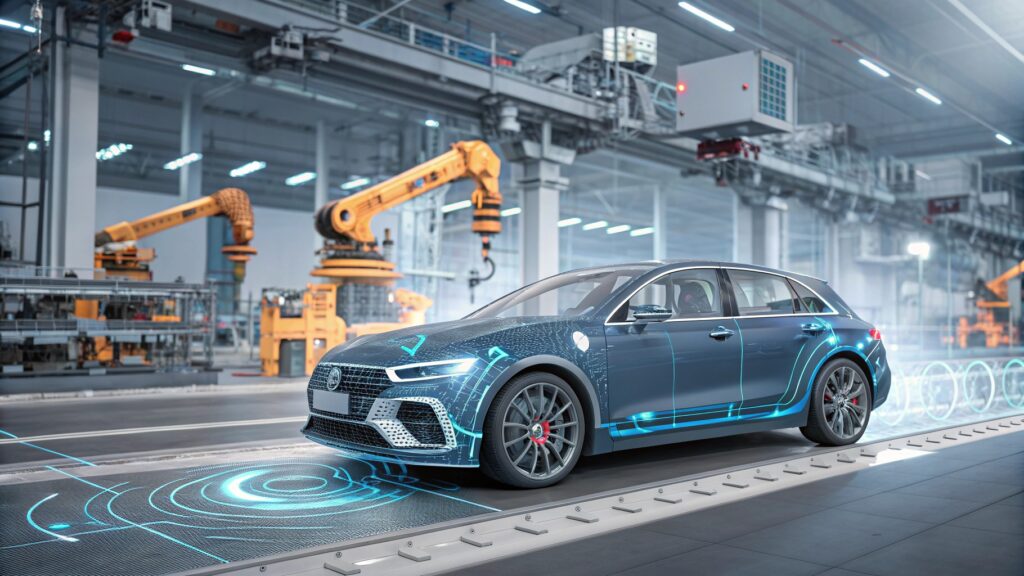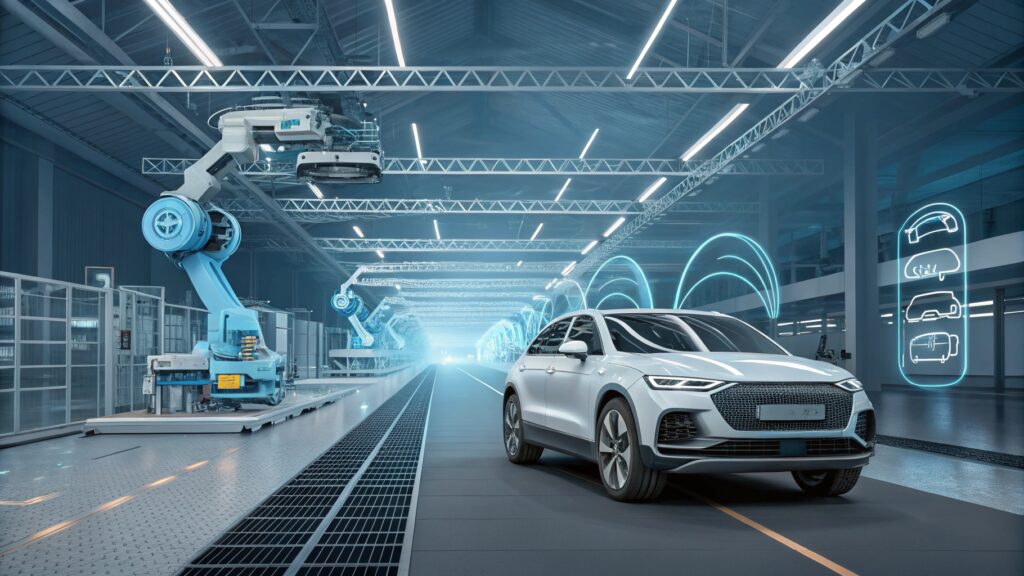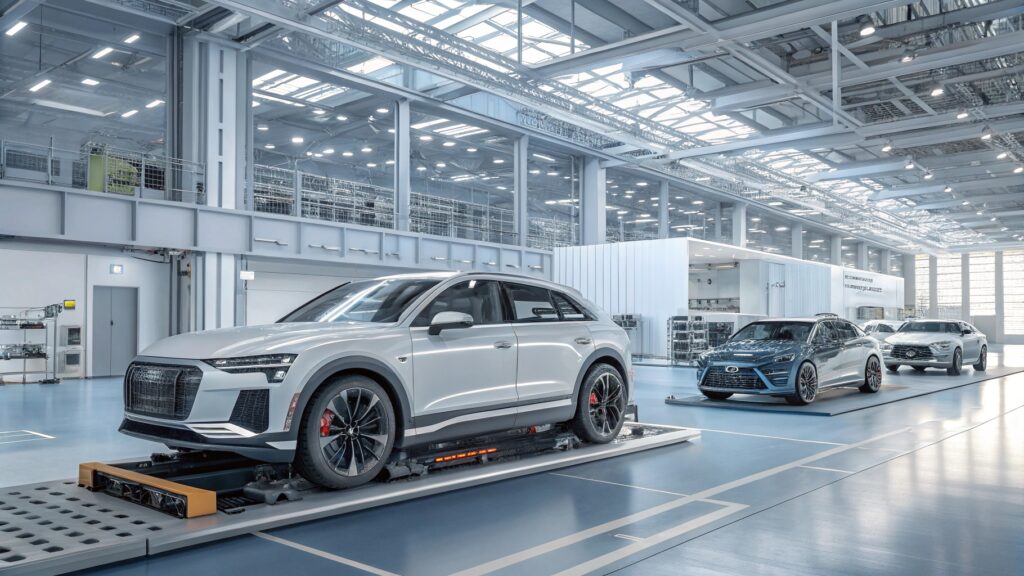Top 7 Benefits of AI in Automotive Industry You Should Know

The once familiar hum of internal combustion engines and the distinct scent of gasoline are no longer the sole hallmarks of the automotive world. A powerful, transformative force is rapidly redefining this landscape: Artificial Intelligence (AI). Far from a distant dream, AI is now deeply embedded in every stage of the industry, from initial design to the finished vehicle, delivering significant advantages that are changing how cars are conceived, manufactured, driven, and maintained. The profound impact of AI on the automotive industry signals a fundamental shift, introducing an era of enhanced safety, greater efficiency, and impressive sustainability.
So, how exactly is AI accelerating progress in the automotive sector? Let’s explore the leading advantages of AI in automotive industry that are propelling this exciting evolution.
Understanding AI’s Role in Automotive
At its core, AI in automotive applications involves intelligent systems capable of perceiving, analyzing, learning, and acting. Within the automobile industry, this translates to sophisticated algorithms that process vast amounts of real-time sensor data. It also includes machine learning models that predict component failures before they become critical. AI empowers vehicles to comprehend their surroundings, respond intelligently to dynamic situations, and even customize the driving experience. Ultimately, AI creates smarter machines that assist, and eventually, may even surpass human capabilities in complex tasks, leading to substantial improvements across the entire domain.

The Transformative Benefits of AI in Automotive Industry
The integration of AI represents more than just incremental improvements; it’s a profound paradigm shift. This brings a multitude of benefits of artificial intelligence in cars and their broader ecosystem. Here are the top seven advantages you should understand:
1. Revolutionizing Automotive Safety
Safety is always a top priority in the automotive industry. AI elevates safety standards by enabling proactive and preventative measures, far exceeding what human drivers can consistently manage.
How AI Enhances Self-Driving or Autonomous Vehicles?
The aspiration for self-driving cars relies entirely on AI. AI enhances self-driving or autonomous vehicles through advanced Driver-Assistance Systems (ADAS). These AI-powered systems, now common even in conventional cars, include features such as adaptive cruise control, lane-keeping assist, and automatic emergency braking. AI-driven computer vision systems, which use cameras, LiDAR, and radar, accurately recognize pedestrians, cyclists, other vehicles, and traffic signs. These systems predict potential hazards, analyze complex traffic scenarios, and make instantaneous decisions, significantly reducing collision risks. For example, Lumenalta highlights how AI provides enhanced safety features and robust driver assistance by continuously monitoring the environment and driver behavior.
Additionally, AI contributes to safety through Vehicle-to-Vehicle (V2V) and Vehicle-to-Infrastructure (V2I) communication. Here, cars and traffic systems exchange real-time data, creating a more cohesive and ultimately safer driving environment.
How is AI Used in Real-Time Traffic Analysis to Improve Driving Safety?
Beyond individual vehicles, AI plays a crucial role in wider traffic management and safety. AI is used in real-time traffic analysis to improve driving safety by monitoring traffic flow, identifying congestion, and detecting incidents like accidents or stalled vehicles. Companies like Yellow Systems and various industry discussions emphasize AI’s capability for real-time traffic management. AI-powered surveillance systems use computer vision to spot violations, while predictive analytics forecast traffic conditions and identify high-risk areas based on historical data and current events. This supports dynamic rerouting, optimized traffic light sequencing, and quicker emergency response, all enhancing road safety for everyone.
2. Enhancing Vehicle Performance and Efficiency
The benefits of artificial intelligence in cars directly translate into improved vehicle performance and overall efficiency. AI algorithms optimize various vehicle parameters, resulting in a smoother, more responsive, and more economical driving experience. This includes sophisticated engine management systems that fine-tune fuel injection for optimal combustion. It also covers intelligent transmission control, which adapts to specific driving styles and changing road conditions.
For electric vehicles (EVs), AI is a major advantage for battery management systems. It meticulously monitors battery health, temperature, and charging cycles, optimizing energy usage to extend range and prolong battery life. By analyzing driving patterns and external factors, AI also provides highly accurate range predictions, easing range anxiety for EV owners. This precise control over vehicle components directly leads to improved fuel economy (or energy efficiency for EVs) and reduced emissions, contributing to a more sustainable automotive footprint.
3. Optimizing Automotive Design and Manufacturing
The process of bringing a car from concept to production is incredibly complex. AI streamlines this journey, making it faster, more innovative, and more cost-effective.
What is the Role of Artificial Intelligence in Automotive Design?
AI fundamentally changes how cars are designed. The role of artificial intelligence in automotive design is increasingly prominent in generative design. Rather than engineers meticulously creating design iterations, AI algorithms quickly explore thousands, even millions, of design possibilities. These possibilities are based on specified parameters like aerodynamics, weight reduction, and structural integrity. Companies like Neural Concept and Dessia Technologies lead this field, using AI to generate novel car prototypes and refine vehicle designs with digital twins. This significantly accelerates the ideation phase and can uncover optimal designs that human engineers might not initially consider.

Is AI Transforming Automotive Design Processes?
Yes, AI is transforming automotive design processes by serving as a powerful “design co-pilot.” Engineers leverage AI to perform complex simulations, test virtual prototypes, and predict performance under various conditions, all before any physical component is manufactured. This drastically reduces the need for expensive and time-consuming physical prototyping. AI also helps manage design complexity, optimize component sizing, and ensure seamless integration of various systems. This not only speeds up the development cycle but also leads to more robust, efficient, and aesthetically pleasing vehicles, as highlighted by Lumenalta’s contributions in this domain.
4. Predictive Maintenance for Cost Savings and Reliability
One of the most significant benefits of Artificial intelligence in automotive industry for both consumers and fleet operators is the move from reactive to predictive vehicle maintenance.
What Role Does AI Play in Predictive Vehicle Maintenance?
Historically, vehicle maintenance relied on fixed schedules or reacting to breakdowns. However, AI plays a pivotal role in predictive vehicle maintenance by analyzing real-time sensor data from various vehicle components. These include engines, brakes, and tires. AI models detect subtle anomalies and patterns that indicate impending failures long before they become critical. For example, XenonStack, Advanced Technology Services, and Neuronimbus all emphasize the power of AI in predictive maintenance technology. This proactive approach allows for early detection of issues, meaning maintenance can be scheduled precisely when needed, avoiding unnecessary early service or costly late repairs. This minimizes unexpected downtime and extends the operational life of vehicles.
Does AI in Automotive Lead to Reduced Vehicle Maintenance Costs?
Indeed, AI in automotive leads to reduced vehicle maintenance costs. By predicting failures, AI helps prevent expensive, catastrophic breakdowns that often require extensive repairs and towing. It enables proactive scheduling of repairs during off-peak hours or planned downtime, minimizing operational disruptions for fleet managers and inconvenience for individual owners. This also reduces emergency repairs and warranty claims. According to Charter Global, referencing Deloitte, predictive maintenance can reduce maintenance costs by up to 25%. Furthermore, improved diagnostics reduce the time mechanics spend troubleshooting, resulting in more efficient and less costly repairs at service centers.
5. Driving Eco-Friendly Manufacturing and Operations
As environmental concerns grow, the automotive industry faces increasing pressure to become more sustainable. AI proves to be an invaluable tool in this effort, significantly contributing to eco-friendly automotive manufacturing.
How Does AI Contribute to Eco-Friendly Automotive Manufacturing?

AI helps minimize waste and scrap during manufacturing through highly precise quality control. AI-powered vision systems identify defects early, preventing entire batches of components from being wasted. AI also optimizes energy usage within manufacturing plants by managing machinery, lighting, and HVAC systems more efficiently, adapting to production schedules and external conditions. Companies like Flags Software and Neuronimbus exemplify AI’s role in this area.
Beyond the factory floor, AI streamlines supply chains. This reduces the need for excessive inventory and optimizes transportation routes for parts and finished vehicles, thereby cutting fuel consumption and emissions. AI-powered simulations in the design phase also reduce the need for physical prototypes, further lowering material consumption and waste.
6. Enhancing the In-Car Experience
The car is no longer just a means of transport; it’s an extension of our digital lives. AI spearheads efforts to enhance the in-car experience, making it more personalized, intuitive, and enjoyable. AI-powered infotainment systems learn driver and passenger preferences, automatically adjusting climate control, audio settings, and even seat positions.
Sophisticated AI-powered virtual assistants, similar to those in smart homes, allow for intuitive voice commands for navigation, media control, and vehicle health updates. These systems adapt and learn over time, providing increasingly personalized and seamless interactions. Features like driver monitoring systems, which use AI to detect fatigue or distraction, also contribute to a safer and more comfortable ride by prompting the driver to take breaks or re-focus. Companies like Sonatus are innovating in this space to create highly personalized and adaptive cabin experiences.
7. Streamlined Supply Chain and Logistics
The automotive supply chain is a complex global network of parts, suppliers, and logistics. AI brings crucial efficiency and resilience to this intricate system. AI-driven demand forecasting models predict demand for specific vehicle models or parts with greater accuracy. This leads to optimized inventory levels and reduced carrying costs.
AI algorithms optimize delivery routes for parts and finished vehicles, minimizing transit times, fuel consumption, and delivery costs. By analyzing real-time data from various points in the supply chain, AI identifies potential bottlenecks, predicts disruptions (like weather events or geopolitical issues), and suggests alternative solutions. This proactive approach, highlighted by Lumenalta and Korcomptenz, ensures a smoother flow of goods, reduces operational inefficiencies, and improves the overall responsiveness and resilience of the automotive supply chain.
The Broader Impact and Future Outlook
The overall impact of AI on the automotive industry is profound and extensive. It’s not just about minor improvements; it’s about enabling entirely new capabilities and business models. AI fosters continuous learning and adaptation within vehicles and manufacturing processes. This allows for over-the-air updates that improve performance and add new features long after a car leaves the dealership. From autonomous fleets revolutionizing transportation to smart city ecosystems optimized by AI for traffic flow and public safety, AI is the fundamental technology making these advancements possible. For automotive companies, adopting AI is no longer optional; it is essential for competitive advantage and long-term viability.
Conclusion
The benefits of Artificial intelligence in automotive industry are clear and transformative. From making our roads significantly safer and vehicles more efficient, to revolutionizing how cars are designed, manufactured, and maintained, AI drives an unparalleled era of innovation. It reduces costs, enhances user experiences, and contributes to a more eco-friendly future. As AI continues to evolve, its integration into the automotive world will only deepen, promising a future where driving is not just a journey, but a safer, smarter, and more sustainable experience for everyone.




